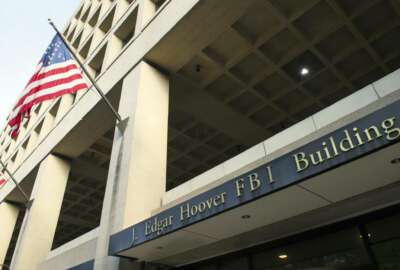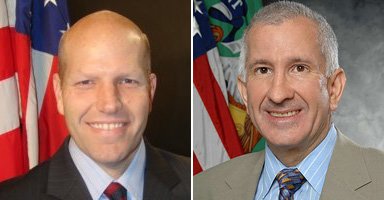

The new commissioner of GSA's Federal Acquisition Service endorses a controversial House proposal that would enlist online commercial marketplaces like Amazon to...
The Trump administration is throwing its weight behind a congressional proposal that would largely bypass the government’s existing mechanisms for buying commercial goods, giving a full-throated endorsement to the idea of Amazon-like “marketplaces” for federal purchasing.
The General Services Administration has worked closely with Rep. Mac Thornberry (R-Texas), the chairman of the House Armed Services Committee, on his proposal to require the government to create new business deals with at least two companies that already run commercial e-commerce platforms, said Alan Thomas, the newly-appointed commissioner of GSA’s Federal Acquisition Service.
“We are pretty excited about the Thornberry bill and the ability of the commercial marketplaces and GSA’s role to sort of sponsor and broker those and help make those work within the construct of the federal procurement system,” he told a hearing of the House Oversight and Government Reform committee last week. “We think that’s a real step in the right direction, and from our standpoint, we’re supportive.”
The initial draft proposal for the marketplaces would have applied only to the Defense Department, but the final version of the National Defense Authorization Act that passed the full House last week would implement them governmentwide. The legislation would order GSA to contract with “two or more” companies that run existing online e-commerce portals so that federal agencies could use them to quickly purchase commercial goods.
The reaction from federal contracting groups has ranged from outright hostility to guarded skepticism.
Vendors fear it would create a private duopoly in which they would have to pay other companies for the privilege of gaining access to the federal market. GSA would select the marketplace operators without any competitive bidding process, and it’s unclear how the new purchasing route would mesh with the voluminous body of laws and regulations that already exist for commercial item procurement, small business contracting and Buy American requirements.
Thomas appeared to acknowledge some of those complications in his testimony last week.
“There are, as you know, some specific regulatory and policy concerns that the federal government has that those of us who just buy as private citizens through Amazon don’t necessarily have to take into account,” he said. “So we want to make sure that those are accounted for in the appropriate way. But I do think introducing commercial marketplaces like that into the government buying process should yield some savings and some speed and offer some simplification.”
Thomas said GSA was also committed to making it easier and faster for vendors to begin selling through its existing multiple-award schedules program, and that it had already seen some success toward that objective with regard to Schedule 70, which focuses on information technology products and services.
The brief and sparsely-attended hearing did little else to illuminate any changes that might result from the GSA reorganization that prompted Thomas’s appointment last month, when the agency announced it was merging the Technology Transformation Service into the Federal Acquisition Service and that the new FAS commissioner would be a non-career political appointee.
But some of the handful of lawmakers who were present to ask questions made clear that they were uncomfortable with the political status of the top FAS job, which has previously been held by senior career civil servants, including most recently Tom Sharpe, who elected to retire from federal service after last month’s reorganization and after having filed a successful whistleblower retaliation claim against a former GSA administrator.
Rep. Gerry Connolly (D-Va.) said that GSA officials had advised congressional staff in a bipartisan briefing that the decision to make the FAS commissioner a political position came directly from the White House.
“This could raise concerns in any administration, but for me, it’s downright frightening in this administration. President Trump has the ability to fire the FAS commissioner at the same time that he has pending business at GSA, existing contracts with federal agencies and continues to receive income from other federal investments with his business partners,” said Connolly, who added that his concerns were not specifically directed toward Thomas. “This is not about you personally. It’s about ensuring that you and any commissioner who follows is protected from the political process.”
And Rep. Robin Kelly (D-Ill.) said she worried that the change would further exacerbate difficulties Democratic congressional members have had in obtaining documents from GSA since the beginning of the Trump administration. In a separate hearing, Tim Horne, the acting GSA administrator, confirmed GSA will now only respond to congressional inquiries if they are signed by the chairman of a congressional committee.
“The Seven Member Rule requires an executive branch agency to provide any requests and information by any seven members of the Oversight Committee … this year, members of the Oversight Committee sent GSA another request pursuant to the Seven Member Rule. To date, GSA has not responded,” Kelly said. “This cannot be the status quo. GSA plays a critical role in our government and the American people deserve answers and transparency, especially when those Americans are members of this committee.”
Copyright © 2025 Federal News Network. All rights reserved. This website is not intended for users located within the European Economic Area.
Jared Serbu is deputy editor of Federal News Network and reports on the Defense Department’s contracting, legislative, workforce and IT issues.
Follow @jserbuWFED



